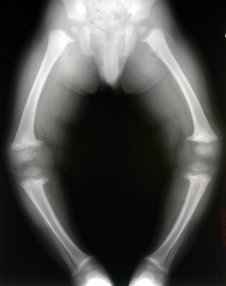
Vitamin D deficiency is quite common in babies, and breast-fed infants appear to be at greater risk than bottle-fed ones, according to a new study.
Researchers found "suboptimal" levels of the bone-building vitamin in 40 percent of 380 otherwise healthy infants and toddlers tested at Children's Hospital Boston, with 12 percent considered to be clinically deficient. Breast-fed infants were up to 10 times more likely to be deficient in vitamin D than their bottle-fed counterparts, according to the study in the June issue of the Archives of Pediatrics and Adolescent Medicine.
In addition to helping build strong bones, vitamin D - which the body synthesizes from sunlight - may play a key role in reducing the risk of diabetes, multiple sclerosis, and some cancers. The fat-soluble vitamin is generally present in foods only in small quantities, so in the United States, it's added to milk, multivitamins, and some cereals and juices.
Rates of vitamin D deficiencies are on the rise in both children and adults, research shows, as we slather on sunscreen and spend more time indoors.
But the new study's findings go straight to the heart of an ongoing debate in medicine - how much vitamin D do we really need, and what's the best way to get it?
In a cautionary editorial accompanying the study, University of Washington pediatrics professor Dr. James A. Taylor noted a lack of consensus among medical experts about what constitutes the best level of vitamin D for health. There is little research showing any long-term effects from early vitamin D deficiency in children, Taylor said, although he acknowledged that such research would be difficult to conduct.
"It seems like we're medicalizing people that we don't need to medicalize," Taylor said. "The question is whether these children have any long-term health risks, and I don't think we know that."
The new study involved a largely African-American and Latino group of children, aged 8 to 24 months, who visited a clinic at Children's Hospital between 2005 and 2007.
Dark-skinned children and adults are at particular risk of deficiency, because the extra pigmentation in their skin interferes with the body's ability to produce the vitamin. Vitamin D levels also have been shown to decline in winter months.
Only 20 of the children were exclusively breast-fed, and of those, only six received a vitamin D supplement. The researchers performed X-rays on the children whose blood tests showed a vitamin D deficiency and found that nearly a third showed evidence of the weakening that can lead to rickets, a softening of the bones that can trigger fractures and deformities. One child even showed physical signs of the disease. The vitamin D-deficient children were offered enrollment in a treatment trial.
One of the study's most surprising conclusions is that the primary risk factor for vitamin D deficiency was breastfeeding without supplementation, rather than children's skin color or the time of year, said lead author Dr. Catherine Gordon, director of the Bone Health Program at Children's Hospital.
"A tenfold increase in risk is huge. It's a startling difference" Gordon said, although she acknowledged that the actual number of exclusively breast-fed children was small.
Mothers who breastfeed are often vitamin D-deficient, so the American Academy of Pediatrics since 2003 has recommended supplementing the diets of exclusively breast-fed babies with 200 units a day of vitamin D, particularly if they live in northern climes. Baby formula typically is fortified with vitamin D.
The finding could rile breastfeeding advocates, who fear that recommending supplementation of any kind might scare some women away from the practice, which studies show has other health benefits. Gordon was careful to note that she wholeheartedly supports breastfeeding but recommends vitamin D supplementation.
Noted vitamin D expert Dr. Michael Holick of the Boston University School of Medicine, who praised the study, believes that the American Academy of Pediatrics recommendations for supplementing breast-fed infants is inadequate and that all children require vitamin D supplements and moderate sun exposure for optimal health.
"Vitamin D deficiency is one of the most common medical conditions nationwide," said Holick, who has come under criticism for accepting funding from the tanning industry.
Dermatologists caution that sun exposure can increase the risk of skin cancer.Source: Boston.com


No comments:
Post a Comment